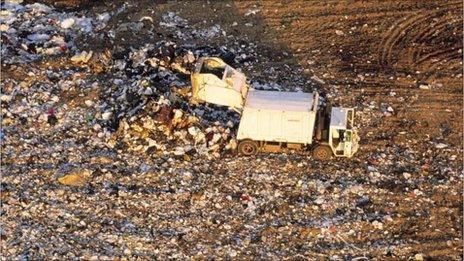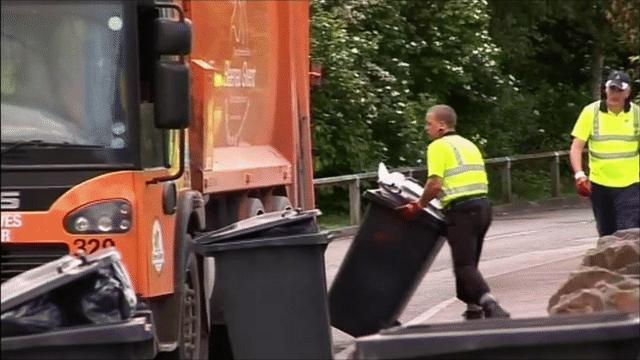Williams Commission report calls for fewer councils
- Published

How the new map of councils in Wales could look following reorganisation
Councils in Wales should merge leaving 10, 11 or 12 local authorities rather than the current 22, a report has recommended.
The Williams Commission said, external discussions about how to proceed with the merger should begin by Easter.
The reorganisation suggests reducing council numbers by mergers using existing boundaries.
Opposition AMs have said they are concerned about the potential costs and loss of local identity in some areas.
The report, by former NHS Wales chief executive Paul Williams, considers how many areas of public services can be improved and made more accountable.
Attention is focused on the recommendations for local authorities, last reorganised two decades ago.
The report recommends the new councils should be within current health board and police force areas and also not cross the geographical areas governing eligibility for EU aid.
The report said change must be implemented "quickly and decisively".
"We have reflected very carefully on our findings and conclusions on this issue. We are well aware that what we propose will incur costs, and will be disruptive and controversial - but we are convinced that doing nothing would be worse," it added.
The report has concluded, as a minimum, the following local authorities should merge:
Isle of Anglesey and Gwynedd
Conwy and Denbighshire
Flintshire and Wrexham
Ceredigion and Pembrokeshire
Neath Port Talbot and Bridgend
Rhondda Cynon Taf and Merthyr Tydfil
Cardiff and the Vale of Glamorgan
Blaenau Gwent, Caerphilly and Torfaen
Monmouthshire and Newport
With Carmarthenshire, Powys and Swansea unchanged, this would yield 12 authorities.
Using these mergers as building blocks, the report said, there were other viable possibilities resulting in 11 or 10 local authorities.
Swansea could merge with Neath Port Talbot and Bridgend to form a single local authority, giving 11 local authorities in total.
It is also an option to merge Carmarthenshire with Ceredigion and Pembrokeshire to form a single local authority, again yielding 11 local authorities in total.
The cost of merging Welsh councils could be met from savings made within as little as 18 months to two-and-a-half years, the Williams report predicted.
While it does not put a figure on the costing, the report said: "If merger is implemented properly and with pace, it can protect front-line services and jobs sustainably and effectively. That alone makes a compelling case for the changes we propose."
The report also said fire and ambulance services should work more closely together.
The Welsh Local Government Association said in a statement: "We live in a time of unprecedented cuts in public spending but also know that demands on public services have never been greater.
"Government must be clear whether a reorganisation will assist in alleviating these pressures or exacerbate them."
It called for clarity on timescales. staffing implications and how it would be paid for.
'Change inevitable'
First Minister Carwyn Jones told Wales Today presenter Jamie Owen what would happen next
Responding to the report, First Minister Carwyn Jones said: "This report addresses many issues that are critical at a time when the need for public services is outstripping the resources available to provide them. I have always been clear that the status quo is not an option.
"Change is inevitable and essential so that our public services can become more efficient, effective, accessible and responsive."
Welsh Conservative leader Andrew RT Davies said: "From a local perspective it is almost inevitable now that the Vale of Glamorgan will be amalgamated with Cardiff, as is the case with health in the area. However, it should be remembered that big is not always beautiful.
"The whole process should be underpinned by a debate about what services we as residents expect local authorities to deliver. Ultimately it would be a sad day for democracy in Wales if any systemic reform leads communities to feel greater disconnect with local authorities."
Peter Black AM, Welsh Liberal Democrat spokesman for local government, said: "The next local government reorganisation must be for keeps. We cannot afford to be considering ripping it up and starting again in 15 or 20 years time."
"I'm prepared to support re-organisation if we get it right. That means having councils which are representative, with a fair voting system such as the single transferable vote, so that the outcome of elections are reflected in the way councils are elected."
Plaid Cymru AM Rhodri Glyn Thomas said the government needed to take "direct" action.
"The weight of evidence presented to the Williams Commission shows that if the people of Wales are going to get the services they need and deserve then there has to be a radical improvement in the way public services are delivered," he said.
- Published20 January 2014

- Published17 January 2014

- Published17 January 2014
- Published15 January 2014
